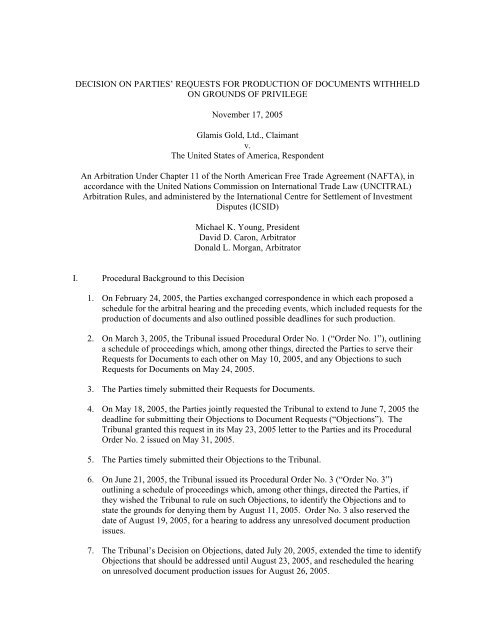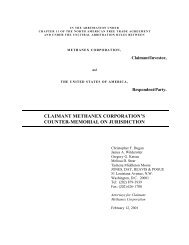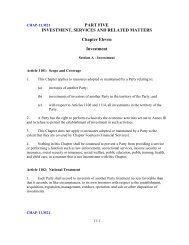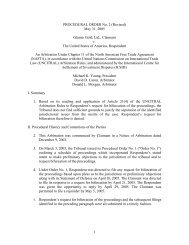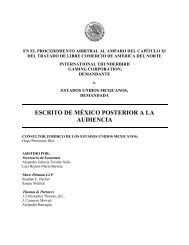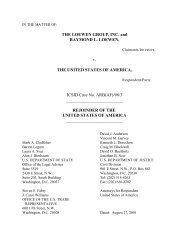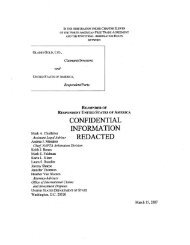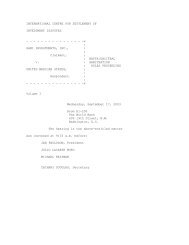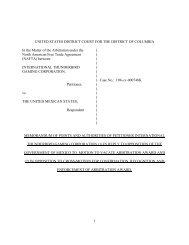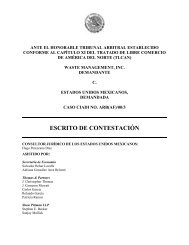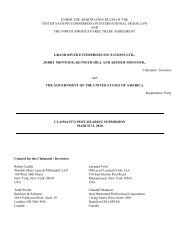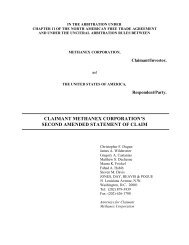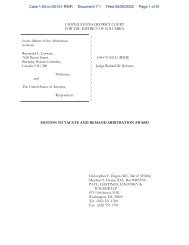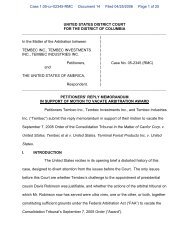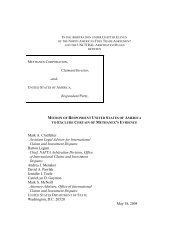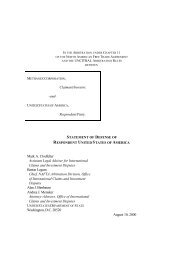REQUESTS FOR PRODUCTION OF DOCUMENTS WITHHELD ON ...
REQUESTS FOR PRODUCTION OF DOCUMENTS WITHHELD ON ...
REQUESTS FOR PRODUCTION OF DOCUMENTS WITHHELD ON ...
You also want an ePaper? Increase the reach of your titles
YUMPU automatically turns print PDFs into web optimized ePapers that Google loves.
DECISI<strong>ON</strong> <strong>ON</strong> PARTIES’ <strong>REQUESTS</strong> <strong>FOR</strong> <strong>PRODUCTI<strong>ON</strong></strong> <strong>OF</strong> <strong>DOCUMENTS</strong> <strong>WITHHELD</strong><br />
<strong>ON</strong> GROUNDS <strong>OF</strong> PRIVILEGE<br />
November 17, 2005<br />
Glamis Gold, Ltd., Claimant<br />
v.<br />
The United States of America, Respondent<br />
An Arbitration Under Chapter 11 of the North American Free Trade Agreement (NAFTA), in<br />
accordance with the United Nations Commission on International Trade Law (UNCITRAL)<br />
Arbitration Rules, and administered by the International Centre for Settlement of Investment<br />
Disputes (ICSID)<br />
I. Procedural Background to this Decision<br />
Michael K. Young, President<br />
David D. Caron, Arbitrator<br />
Donald L. Morgan, Arbitrator<br />
1. On February 24, 2005, the Parties exchanged correspondence in which each proposed a<br />
schedule for the arbitral hearing and the preceding events, which included requests for the<br />
production of documents and also outlined possible deadlines for such production.<br />
2. On March 3, 2005, the Tribunal issued Procedural Order No. 1 (“Order No. 1”), outlining<br />
a schedule of proceedings which, among other things, directed the Parties to serve their<br />
Requests for Documents to each other on May 10, 2005, and any Objections to such<br />
Requests for Documents on May 24, 2005.<br />
3. The Parties timely submitted their Requests for Documents.<br />
4. On May 18, 2005, the Parties jointly requested the Tribunal to extend to June 7, 2005 the<br />
deadline for submitting their Objections to Document Requests (“Objections”). The<br />
Tribunal granted this request in its May 23, 2005 letter to the Parties and its Procedural<br />
Order No. 2 issued on May 31, 2005.<br />
5. The Parties timely submitted their Objections to the Tribunal.<br />
6. On June 21, 2005, the Tribunal issued its Procedural Order No. 3 (“Order No. 3”)<br />
outlining a schedule of proceedings which, among other things, directed the Parties, if<br />
they wished the Tribunal to rule on such Objections, to identify the Objections and to<br />
state the grounds for denying them by August 11, 2005. Order No. 3 also reserved the<br />
date of August 19, 2005, for a hearing to address any unresolved document production<br />
issues.<br />
7. The Tribunal’s Decision on Objections, dated July 20, 2005, extended the time to identify<br />
Objections that should be addressed until August 23, 2005, and rescheduled the hearing<br />
on unresolved document production issues for August 26, 2005.
8. By letter of August 19, 2005, the Parties requested a further extension to identify<br />
Objections that should be addressed until September 15, 2005, and proposed a tentative<br />
scheduling of a hearing for the week of September 26, 2005. The letter stated that no<br />
other change was requested in the schedule in Order No. 1, as amended. The Tribunal<br />
informally advised the Parties that the extension would be granted and suggested several<br />
possible hearing dates.<br />
9. On August 26, 2005, the Tribunal issued its Procedural Order No. 4 that, among other<br />
things, confirmed the extension of the time until August 26, 2005, for the Parties to<br />
identify Objections to Document Requests on which they wished the Tribunal to rule.<br />
10. A hearing on such Objections was scheduled for October 3, 2005.<br />
11. By email dated September 15, 2005, counsel for the Claimant requested a one-day<br />
extension for both Parties for identification of such Objections, on the ground that the<br />
extension was necessary due to the extensive nature of the documentary discovery in this<br />
arbitration. The email states that counsel for the Respondent had been consulted and did<br />
not oppose the request.<br />
12. On September 16, 2005, the Claimant submitted a Request for Production of Documents<br />
Withheld by Respondent. The Request consisted of a 35-page legal memorandum and<br />
various documentary appendices.<br />
13. On September 19, 2005, the Tribunal issued its Procedural Order No. 5, extending until<br />
September 16, 2005, the time for identification of Objections. Additionally, the Tribunal<br />
granted the Respondent until September 29, 2005, to file a memorandum in opposition to<br />
the Claimant’s memorandum of September 16, 2005. The schedule for further<br />
proceedings was otherwise unchanged.<br />
14. On September 29, 2005, the Respondent submitted a Response to Glamis’s Request for<br />
Production of Privileged Documents. The Response consisted of a 25-page legal<br />
memorandum and appendices.<br />
15. On October 3, 2005, a hearing was conducted before the Tribunal in Washington, D.C., at<br />
the World Bank.<br />
II. Applicable Law<br />
16. This Arbitration is conducted under the UNCITRAL Arbitration Rules.<br />
17. The UNCITRAL Rules in Article 24 provide:<br />
1. Each party shall have the burden of proving the facts relied on to support<br />
his claim or defence.<br />
2. The arbitral tribunal may, if it considers it appropriate, require a party to<br />
deliver to the tribunal and to the other party, within such a period of time<br />
as the arbitral tribunal shall decide, a summary of the documents and<br />
other evidence which that party intends to present in support of the facts<br />
in issue set out in his statement of claim or statement of defence.<br />
2
3. At any time during the arbitral proceedings the arbitral tribunal may<br />
require the parties to produce documents, exhibits or other evidence<br />
within such a period of time as the tribunal shall determine.<br />
Article 24 makes clear the authority of the Tribunal to order the production of<br />
“documents, exhibits or other evidence”, but provides little guidance as to the exercise of<br />
that authority. The UNCITRAL rules are silent on the subject of the assertion of claimed<br />
privileges and provide no explicit guidance as to the Tribunal’s ruling on such claims. It<br />
is only stated under Article 15(1) of the Rules that “the arbitral tribunal may conduct the<br />
arbitration in such manner as it considers appropriate, provided that the parties are treated<br />
with equality and that at any stage of the proceedings each party is given a full<br />
opportunity of presenting his case.”<br />
18. In their submissions on document production issues, both Parties cited the rules of the<br />
International Bar Association as a source of guidance for the Tribunal on production of<br />
documents. The Tribunal observes that those rules provide that documents requested<br />
should be “material” to the proceeding. The Tribunal in its previous decisions has<br />
adopted the requirement of materiality.<br />
19. The Tribunal recognizes that, in international arbitration, procedural matters such as the<br />
applicability of privileges and the form of objections to such assertions can be set out by<br />
the agreement of the Parties. The Parties in their submissions, and at the hearing, appear<br />
to agree that the privilege law of the United States should be looked to by the Tribunal<br />
for guidance as to the law of privilege to be applied in this arbitration. The Parties,<br />
however, disagree as to which jurisdiction of the United States reference should be made.<br />
Claimant points to the law of the D.C. Circuit or federal common law which it views as<br />
most reflecting the expectations of the Parties, while Respondent favors those principles<br />
that are common among the jurisdictions, noting that Claimant could have as easily filed<br />
a suit in the courts of the State of California, or in the Federal Court in Nevada.<br />
20. The Tribunal observes that the law of the United States, both as to production of<br />
documents or to the privilege enjoyed by some set of documents, is not directly<br />
applicable to this arbitration. Rather document production in this arbitration is governed<br />
by Article 24 of the UNCITRAL Arbitration Rules and guided by the Parties’ own<br />
agreements to production as evidenced in their February 24, 2005 letters. Moreover, the<br />
Tribunal observes that it is unlikely in any event that the expectations of the United States<br />
as a party to the NAFTA as to privileges that it might enjoy in the NAFTA chapter 11<br />
arbitrations would vary proceeding to proceeding depending on the jurisdictions in which<br />
a particular claimant might field an action. Thus the Tribunal has reviewed the case law<br />
of numerous United States jurisdictions—including California and the District of<br />
Columbia, neither of which were found to be outliers—and attempted to identify general<br />
consensus between courts that might be helpful in defining what the Parties would<br />
reasonably expect to apply in this situation. The Tribunal then used this information,<br />
combined with its knowledge of and appreciation for the differences between court<br />
proceedings and international arbitration, 1 to craft standards that can assist the Parties in<br />
assessing their claims of privilege and their objections to such claims.<br />
1 With respect to the differences between domestic litigation and international arbitration, the Tribunal<br />
recognizes that it is generally understood that one reason parties choose arbitration is to avoid the relatively<br />
extensive document production practices of courts generally and United States courts in particular. It feels<br />
that this expectation is not generally different in the context of NAFTA Chapter 11 arbitration, although the<br />
3
III. Decisions Regarding Parties’ Arguments over Assertions of Privilege<br />
Decision as to Claimant’s Request for Production of Documents Withheld by Respondent on<br />
Grounds of the Attorney-Client Privilege<br />
21. Claimant believes that many of the documents that Respondent withheld from production<br />
on grounds of attorney-client privilege do not in fact qualify for protection under this<br />
privilege. Claimant argues that only in “exceptional circumstances” can the attorneyclient<br />
privilege be properly invoked by a government agency. Claimant believes that a<br />
special showing is required for government attorneys invoking the privilege to<br />
demonstrate that they were acting in the capacity of lawyers, and not policy-makers. 2<br />
The Claimant then argues Respondent has, with respect to numerous documents, not<br />
made a sufficient showing of this fact in its privilege logs. In addition, Claimant argues<br />
that the attorney-client privilege only protects communications “rest[ing] on confidential<br />
information” and, therefore, when a government agency is the client, it must be shown<br />
that the underlying facts are unknown to third parties outside that agency. 3 It asserts that<br />
this requirement prevents the withholding of documents that merely apply regulations to<br />
non-confidential factual situations. 4 Claimant also argues that the confidentiality of the<br />
underlying information was not asserted properly in Respondent’s privilege logs.<br />
22. Respondent objects to Claimant’s interpretation of the attorney-client privilege and its<br />
allegations that the privilege is applied more stringently to government, as opposed to<br />
private, attorneys. 5 Respondent argues that the privilege is applied equally to government<br />
attorneys and actually applies with “special force in the government context” where<br />
officials are “expected to uphold and execute the law and … may face criminal<br />
prosecution for failing to do so….” 6 Respondent also argues that it has made a prima<br />
facie showing of the attorney-client privilege with the descriptions in its privilege logs<br />
and the burden is now on Claimant to put forward a document-by-document explanation<br />
of why the privilege should not apply.<br />
23. The Tribunal notes that the party asserting the privilege has the burden of proving that<br />
such privilege applies to each document 7 but, after that showing is made, the burden<br />
shifts to the other party to contest the privilege. The Tribunal recognizes that, when<br />
asserting this privilege, it is important to make clear that the attorney is indeed acting as<br />
such and providing legal advice, and is not acting as a policy-maker or corporate officer. 8<br />
Tribunal notes that the investment arbitration context in which there may not be a contractual relationship<br />
between the parties does distinguish such proceedings from international commercial arbitration and thus<br />
militates in favor of some greater receptiveness on the part of the Tribunal for document production<br />
requests.<br />
2 Claimant’s Request for Production of Certain Documents Withheld by Respondent, September 16, 2005,<br />
(“Request”) p. 5.<br />
3<br />
Request, p. 6.<br />
4<br />
Request, p. 7.<br />
5<br />
Response to Glamis’s Request for Production of Privileged Documents, September 29, 2005,<br />
(“Response”) p. 5.<br />
6<br />
Id., quoting In Re Grand Jury Investigation, 399 F.3d 527, 534 (2d Cir. 2005).<br />
7<br />
See Coastal States Gas Corp. v. Dep’t of Energy, 617 F.2d 845, 861 (D.C. Cir. 1980); Cobell v. Norton,<br />
212 F.R.D. 24, 27 (D.D.C. 2002).<br />
8 See Burlington Indus. v. Exxon Corp., 65 F.R.D. 26 (D. Md. 1974); Coastal Corp. v. Duncan, 86 F.R.D.<br />
514, 521 (D.Del. 1980).<br />
4
Therefore, it is critical that, when invoking the privilege, the invoking party explain with<br />
sufficient specificity the role the attorney is taking.<br />
24. With respect to government attorneys, the Tribunal finds a general consensus among<br />
courts that the attorney-client privilege applies equally to government agencies: “[i]n the<br />
governmental context, the ‘client’ may be the agency and the attorney may be an agency<br />
lawyer.” 9 The Tribunal finds the application of this consensus rule is appropriate to this<br />
Arbitration. Furthermore, the Tribunal recognizes that an important prerequisite to<br />
assertion of the attorney-client privilege is the confidentiality of the information. The<br />
Tribunal understands, however, that in the government context, where the client is by<br />
nature a group, the privilege is not defeated by circulation beyond the attorney and the<br />
person within the group requesting or providing the information. 10 Communications<br />
between different government agencies should remain privileged to the extent that there<br />
is a “substantial identity of legal interests” within the different agencies in the particular<br />
subject matter of the communications. 11<br />
25. Considering the current stage of the proceedings and recognizing that both Parties have<br />
made significant efforts in reviewing their own documents and describing those withheld<br />
in their privilege logs, the Tribunal requests that the Parties utilize the following<br />
procedure with respect to documents withheld on grounds of the attorney-client privilege<br />
to which they wish to object:<br />
a. By December 1, 2005, Claimant shall list its objections to Respondent’s assertion<br />
of the attorney-client privilege on a document-by-document basis, specifically<br />
explaining why it believes the privilege does not apply to each document. Where<br />
the Claimant believes there is sufficient explanation within the Respondent’s<br />
privilege log to object substantively to the assertion, it shall do so based upon the<br />
standards stated above. Where the Claimant finds insufficient explanation to<br />
make such an objection, it shall request a more detailed explanation of the<br />
document withheld by the Respondent.<br />
b. In response to such a request, by December 13, 2005, the Respondent shall<br />
provide the Claimant with a more detailed explanation of the basis in the<br />
document for the assertion of the privilege and, if applicable, the basis for an<br />
objection as to the materiality of the document requested. In particular, the<br />
Tribunal foresees that the following completed statement in a privilege log,<br />
absent extraordinary circumstances, would usually suffice to assert the privilege:<br />
“Confidential _____ (Communication/Email/Memo/etc.) dated _____ between<br />
Attorney/Attorney’s Representative _____, who was at the time acting as legal<br />
counsel and not primarily as a policymaker or corporate decision-maker, and<br />
Client/Client Affiliate _____ concerning legal advice on the subject of _____.”<br />
Depending on the objection raised by the Claimant, the Respondent may also be<br />
required to state that “To the extent that this document was circulated to<br />
_________, (a colleague from a different agency), such circulation is protected<br />
because there was substantial identity of legal interests between the two agencies<br />
with respect to the particular subject matter of the communication.”<br />
9 Tax Analysts v. I.R.S., 117 F.3d 607, 618 (D.C. Cir. 1997).<br />
10 Coastal States, supra, at 863.<br />
11 U.S. v. American Tel. & Tel. Co., 86 F.R.D. 603, 616-17 (D.D.C. 1979).<br />
5
c. Should this explanation not satisfy the Claimant, the Claimant should respond by<br />
December 22, 2005, with a detailed explanation as to why it believes this<br />
assertion is incorrect or fails based on the standards listed above.<br />
d. Should these objections not serve to compel production of the disputed<br />
documents, and further discussions with the Respondent do not resolve the<br />
matter, the Tribunal will, if requested by January 3, 2006, decide upon such<br />
objections on a document-by-document basis. Such review may include in<br />
camera review of the documents.<br />
Decision as to Respondent’s Request for Production of Documents Withheld by Claimant on<br />
Grounds of the Attorney-Client and Work Product Privileges<br />
26. Respondent argues that numerous documents withheld by Claimant do not appear to be<br />
protected under the attorney-client or work product privileges, based on the descriptions<br />
provided by Claimant in its privilege logs. 12 Respondent’s concerns center on the<br />
multiple roles played by Mr. Charles Jeannes, who is Glamis’s Executive Vice President,<br />
Administration, General Counsel and Secretary. 13<br />
27. Claimant objects to these requests for documents, explaining that it is common for senior<br />
executives to hold multiple roles, one of them being general counsel and the other an<br />
executive position. It asserted at the October 3 rd hearing that, with respect to all<br />
documents withheld, Mr. Jeannes was acting as general counsel.<br />
28. As explained above, the Tribunal recognizes that, in asserting the attorney-client<br />
privilege, it is critical that the attorney involved in the production of the document in<br />
question is acting as an attorney. The same applies for assertions of the work product<br />
privilege. 14 Based on these understandings, the Tribunal requests the following<br />
procedure with regard to Respondent’s objections to Claimant’s assertions of attorneyclient<br />
and work product privilege:<br />
a. As the objections to these documents are relatively clear, the Tribunal requests<br />
Claimant to issue an amended privilege log with these documents by December<br />
1, 2005. Using the statement provided in the previous section, or something<br />
similar, Claimant is to explain the role that Mr. Jeannes was filling with respect<br />
to each document.<br />
b. Should this explanation not satisfy the Respondent, the Respondent should<br />
respond by December 13, 2005, with a detailed explanation as to why it believes<br />
this assertion is incorrect or fails based on the standards listed above.<br />
c. Should these objections not serve to compel production of the disputed<br />
documents, and further discussions with the Claimant do not resolve the matter,<br />
the Tribunal will, if requested by January 3, 2006, decide upon such objections<br />
on a document-by-document basis. Such review may include in camera review<br />
of the documents.<br />
12<br />
Response, p. 23.<br />
13<br />
Id.<br />
14<br />
See Heger v. Bluefield Regional Medical Center, 170 F.R.D. 70, 76 (D.D.C. 1997), citing Hickman v.<br />
Taylor, 329 U.S. 495, 511 (1947).<br />
6
Decision as to Claimant’s Request for Production of Documents Withheld by Respondent on<br />
Grounds of the Work Product Privilege<br />
29. The core of Claimant’s objections to Respondent’s claims of the work product privilege<br />
is that the documents were not created “in anticipation of litigation or for trial.” 15<br />
Claimant argues that Respondent failed to establish that the withheld documents were<br />
generated because of anticipated litigation, and not in the ordinary course of business,<br />
even if the preparer was aware that the document may be of substantial assistance should<br />
a suit be filed. 16 In addition, Claimant argues that the privilege, even where successfully<br />
asserted, is qualified, and assertions based on documents that were neither litigation<br />
strategy nor attorney mental impressions about litigation preparation activities may be<br />
outweighed by a showing of “substantial need and inability to obtain the equivalent<br />
without undue hardship.” 17<br />
30. Respondent protests Claimant’s interpretation of case law on the subject. Respondent<br />
argues that litigation need not be so imminent; it is sufficient that litigation be “fairly<br />
foreseeable at the time the materials were prepared,” and the withheld documents “must<br />
have been assembled or created with ‘the prospect of litigation in mind.’” 18 According to<br />
Respondent, no “specific claim” need be contemplated at the document’s creation, rather<br />
only the “risk of litigation” need be “fairly foreseeable.” 19 Respondent also objects to<br />
Claimant’s understanding of the qualified nature of the privilege. Respondent asserts that<br />
there is an absolute privilege for “core” work product, which includes “[a]ny writing<br />
reflecting an attorney’s impressions, conclusions, opinions, or legal research or<br />
theories.” 20<br />
31. Most courts recognize that the test for when a document is prepared “in anticipation of<br />
litigation” 21 turns on the function of the documents rather than merely the timing of their<br />
creation. 22 Thus, the content of the documents must relate to preparation for litigation;<br />
this includes “[s]ubject matter that relates to the preparation, strategy, and appraisal of the<br />
strengths and weaknesses of an action, or to the activities of the attorneys involved, rather<br />
than to the underlying evidence….” 23 Based on this understanding of the subject matter,<br />
work product usually encompasses “interviews, statements, memoranda, correspondence,<br />
[and] briefs” of lawyers. 24 With these themes within domestic case law in mind and<br />
recognizing how litigious society currently is and that there is therefore often the<br />
possibility that many actions could lead to litigation, the Tribunal observes that it is<br />
important, when claiming the work product privilege, that the withholding Party explain<br />
15<br />
Request, p. 8.<br />
16<br />
Request, p. 9.<br />
17<br />
Request, p. 10, quoting Judicial Watch, Inc. v. United States DOJ, 337 F.Supp.2d 183, 186 (D.D.C.<br />
2004) (citations omitted).<br />
18<br />
Response, p. 10, quoting Hertzenberg v. Veneman, 273 F.Supp.2d 67, 75 (D.D.C. 2003) (citing Coastal<br />
States, supra at 865).<br />
19<br />
Response, p. 12, citing Schiller v. N.L.R.B., 964 F.2d 1205, 1208 (D.C. Cir. 1992) and Hertzenberg,<br />
supra at 75 (citing Coastal States, supra at 865).<br />
20<br />
Response, p. 10, quoting Letter from Marc Melnick to Andrea J. Menaker (Sept. 29, 2005) (quoting<br />
Izazaga v. Superior Court, 54 Cal.3d 356, 381-82 & n. 19 (1991)).<br />
21<br />
See Hickman, supra at 511-12; see also Fed.Rule.Civ.Proc. 26(b)(3).<br />
22<br />
See Delaney, Migdail & Young, Chartered v. I.R.S., 826 F.2d 124, 127 (D.C. Cir. 1987).<br />
23<br />
In re Air Crash Disaster at Sioux City, 133 F.R.D. 515, 519 (D. Ill. 1990) quoting 4 Moore’s Federal<br />
Practice, para. 26.64[1] at 26-349—350 (1980).<br />
24<br />
Heger, supra at 76, citing Hickman, supra at 393-94.<br />
7
how the subject matter of the document relates to a likely lawsuit by an identifiable<br />
adversary in respect of a specific dispute.<br />
32. With respect to the Parties’ arguments regarding the threshold of need and unavailability<br />
that must be crossed in order to override a claim of work product privilege, the Tribunal<br />
observes that the Parties are actually not wholly in disagreement. Both Parties recognize<br />
that there is “core” work product, including litigation strategies and attorney mental<br />
impressions, among other things, that will not be released without a showing of<br />
extraordinary justification. 25 The Parties appear to disagree therefore only on documents,<br />
or portions of documents, that do not constitute “core” work product. The Tribunal holds<br />
that, with respect to documents not rising to the level of attorney personal thought and<br />
strategy, the privilege is qualified and can be overruled by a sufficient showing of need<br />
and unavailability and a weighing of the importance of the claimed privilege versus the<br />
importance of production.<br />
33. Again, recognizing the extraordinary efforts by both Parties to produce such large<br />
numbers of requested documents to the other party and to carefully log those documents<br />
that they have withheld on privilege grounds, the Tribunal requests the use of the<br />
following procedure in addressing objections to claims of work product privilege:<br />
a. By December 1, 2005, Claimant shall list its objections to Respondent’s assertion<br />
of the work product privilege on a document-by-document basis, specifically<br />
explaining why it believes the privilege does not apply to each document. Where<br />
the Claimant believes there is sufficient explanation within the Respondent’s<br />
privilege log to object substantively to the assertion, it shall do so based upon the<br />
standards stated above. Where the Claimant finds insufficient explanation to<br />
make such an objection, it shall request a more detailed explanation of the<br />
document withheld by the Respondent.<br />
b. In response to such a request, by December 13, 2005, the Respondent shall<br />
provide the Claimant with a more detailed explanation of the basis in the<br />
document for the assertion of the privilege and, if applicable, the basis for an<br />
objection as to the materiality of the document requested. In particular, the<br />
Tribunal foresees that the following completed statement in a privilege log,<br />
absent extraordinary circumstances, would usually suffice to assert the privilege:<br />
“This _____ (Document/Draft/Report/etc.), dated _____, was prepared by<br />
Attorney/Attorney’s Representative _____ because of anticipated litigation and<br />
would not have been prepared in substantially the same form in the absence of<br />
such anticipated litigation.” It will be important for the withholding party to note<br />
whether the document itself identifies a specific pending or potential dispute or<br />
litigation and/or identifies the likely adverse party or parties. Finally, the<br />
withholding party should specify if factual information that can be segregated has<br />
been so removed and produced.<br />
c. Should this explanation not satisfy the Claimant, the Claimant should respond by<br />
December 22, 2005, with a detailed explanation as to either: (i) why it believes<br />
this assertion is incorrect or fails based on the standards listed above; or (ii) why<br />
it believes that its need is so great and the document so unavailable that the<br />
document must be produced regardless of the assertion of the privilege. With<br />
25 Request, p. 10 and Response, p. 10-11.<br />
8
espect to the latter argument, the Claimant shall explain how the document is<br />
likely to provide material evidence to support a factual contention for which the<br />
Tribunal might conclude otherwise lacks clearly probative support.<br />
d. Should these objections not serve to compel production of the disputed<br />
documents, and further discussions with the Respondent do not resolve the<br />
matter, the Tribunal will, if requested by January 3, 2006, decide upon such<br />
objections on a document-by-document basis. Such review may include in<br />
camera review of the documents.<br />
Decision as to Claimant’s Request for Production of Documents Withheld by Respondent on<br />
Grounds of the Deliberative Process Privilege<br />
34. Claimant recognizes that the deliberative process privilege “exempts from disclosure<br />
‘opinions, recommendations or advice offered in the course of the executive’s decision<br />
making processes.’” 26 It protects those documents, Claimant understands, that reflect<br />
“the give and take of the consultative process.” 27 It argues, however, that there is a<br />
significant assertion that must be made to meet the burden of proving the privilege and it<br />
claims that Respondent has not met this burden. Claimant points to case law that requires<br />
that the privilege be asserted by (1) a formal claim of privilege by the head of the<br />
department with control over the information; after (2) actual and personal consideration<br />
by that official; and (3) a detailed specification of the information for which the privilege<br />
is claimed with an explanation of how it falls within the scope of the privilege. 28 Next,<br />
Claimant asserts that the withheld information must be both pre-decisional and<br />
deliberative, meaning it was prepared in order to assist an agency decision-maker in<br />
arriving at a decision, and that it reflects the “give-and-take of the consultative process.” 29<br />
Because of this definition, Claimant argues “any factual information must be<br />
segregated.” 30 Finally, Claimant contends that the deliberative process privilege is also a<br />
qualified privilege that can be overruled after balancing the competing elements,<br />
including the need for production, the need for accurate fact-finding and the<br />
government’s interest in non-disclosure. 31 With respect to numerous documents,<br />
Claimant alleges that Respondent has not met the above burdens and/or Claimant’s need<br />
is so great as to outweigh Claimant’s interest in privacy.<br />
35. Again, the Parties are not wholly in disagreement regarding the definition and scope of<br />
the deliberative process privilege. Respondent agrees that the deliberative process<br />
privilege protects “documents reflecting advisory opinions, recommendations, and<br />
deliberations comprising part of a process by which governmental decisions and policies<br />
are formulated.” 32 In addition, Respondent agrees that the privilege protects only those<br />
documents that are both pre-decisional and deliberative. 33 Respondent, however,<br />
26 Request, p. 10, quoting Taxation with Representation Fund v. IRS, 646 F.2d 666, 667 (D.C. Cir. 1981)<br />
and numerous string cites.<br />
27 Id., quoting Coastal States, supra at 866.<br />
28 Request, p. 11, citing Fonville v. the District of Columbia, _ F.R.D. _, 2005 WL 1244816 (D.D.C.)<br />
(citations omitted).<br />
29 Request, p. 12, quoting Nat’l Ass’n of Home Builders v. Norton, 309 F.3d 26, 39 (D.C. Cir. 2002).<br />
30 Id.<br />
31 Request, p. 13, citing FTC v. Warner Communications, Inc., 742 F.2d 1156, 1161 (9 th Cir. 1984)<br />
(citations omitted).<br />
32 Response, p. 15, quoting N.L.R.B. v. Sears, Roebuck & Co., 421 U.S. 132, 150 (1975).<br />
33 Response, p. 16.<br />
9
qualifies Claimant’s assertion that factual material must be segregated and produced by<br />
pointing to case law that states that “factual information that is ‘inextricably intertwined<br />
with policy making processes’ is considered deliberative and may be withheld from<br />
disclosure.” 34 Respondent also disagrees with Claimant’s assertions that Respondent<br />
failed to meet the burden of properly asserting the privilege. Respondent alleges that it<br />
provided not only detailed privilege logs to Claimant, but also declarations from the<br />
appropriate officials explaining the analysis and determination that had taken place. 35<br />
Finally, Respondent alleges that Claimant has failed to demonstrate a need for the<br />
documents withheld that outweighs the stated interest of the Government in maintaining<br />
the privilege. 36<br />
36. As the Parties do not disagree on the general definition of the scope of the privilege or the<br />
requirement that documents withheld under it be both pre-decisional and deliberative, the<br />
Tribunal adopts these interpretations. To elaborate on these definitions, and possibly to<br />
clear any disagreements between the parties, the Tribunal finds that the privilege shall<br />
encompass documents generated before the adoption of an agency policy or decision that<br />
contain opinions, recommendations or analyses of specific policies or decisions. 37 The<br />
Tribunal agrees that factual information should generally be segregated and produced, 38<br />
but also recognizes that there may be situations in which the factual information is either<br />
so inextricably intertwined with policy information that it cannot be appropriately<br />
segregated or the factual information itself would reveal too much of the deliberative<br />
process to be disclosed. The opposite situation could also occur where deliberative<br />
materials are so benign as to reveal nothing of the deliberative process and should be<br />
produced. 39 As there is thus no black line on which to require production, the Parties and<br />
the Tribunal must evaluate the assertions of the officials who request the privilege.<br />
37. With respect to the burden of assertion and the formal requirements cited by Claimant for<br />
proper assertion, the Tribunal recognizes a general consensus in the case law that the<br />
head of the agency controlling the information must assert the privilege after review and<br />
analysis of the document. 40 Recognizing the conflicting goals of this burden—that a<br />
sufficiently senior official perform the analysis and weighing of the assertion of the<br />
privilege, but that such official must devote substantial time and effort to gain personal<br />
knowledge of each document— and given that the formalities of U.S. practice are neither<br />
directly applicable or necessarily appropriate to arbitration, the Tribunal, absent<br />
extraordinary circumstances, will accept an assertion of the privilege from an official, at<br />
the assistant secretary or deputy secretary level, controlling the information if he/she is<br />
equally or more familiar with the information, rather than an agency head.<br />
34<br />
Response, p. 18, citing Judicial Watch, supra at 1121 (citations omitted).<br />
35<br />
Id.<br />
36<br />
Response, p. 21.<br />
37<br />
See FTC v. Warner Communications, supra at 1161, citing Coastal States, supra at 866.<br />
38<br />
Id.<br />
39<br />
See Mead Data Central, Inc. v. United States Dep’t of the Air Force, 533 F.2d 242, 257 (D.C. Cir. 1977).<br />
40 th<br />
See Branch v. Phillips Petroleum Company v. E.E.O.C., 638 F.2d 873, 882 (5 Cir. 1981); see also<br />
Walker v. NCNB National Bank of Florida, 810 F.Supp. 11, 13 (D.D.C. 1993).<br />
10
38. With these principles in mind, the Tribunal establishes a procedure similar to that<br />
requested for objections to the two previous privileges:<br />
a. By December 1, 2005, Claimant shall list its objections to Respondent’s assertion<br />
of the deliberative process privilege on a document-by-document basis,<br />
specifically explaining why it believes the privilege does not apply to each<br />
document. Where the Claimant believes there is sufficient explanation within the<br />
Respondent’s privilege log to object substantively to the assertion, it shall do so<br />
based upon the standards stated above. Where the Claimant finds insufficient<br />
explanation to make such an objection, it shall request a more detailed<br />
explanation of the document withheld by the Respondent.<br />
b. In response to such a request, by December 13, 2005, the Respondent shall<br />
provide the Claimant with a more detailed explanation of the basis in the<br />
document for the assertion of the privilege and, if applicable, the basis for an<br />
objection as to the materiality of the document requested. In particular, the<br />
Tribunal foresees that the following completed statement in a privilege log,<br />
absent extraordinary circumstances, would usually suffice to assert the privilege:<br />
“The document, dated _____, was prepared in order to assist an agency decisionmaker,<br />
_____ (name), _____ (position) in arriving at a _____ (a specific<br />
decision).” The certifying official must also state: (i) the basis of the assertion of<br />
the privilege has not been incorporated in a final agency decision, and (ii) he/she<br />
believes, in good faith, that the harm of disclosure will overcome the value of the<br />
production of the document to arbitration. Finally, the Respondent should<br />
specify if factual information that can be segregated has been so removed and<br />
produced.<br />
c. Should this explanation not satisfy the Claimant, the Claimant should respond by<br />
December 22, 2005, with a detailed explanation as to either: (i) why it believes<br />
this assertion is incorrect or fails based on the standards listed above; or (ii) why<br />
it believes that its need is so great and the document so unavailable that the<br />
document must be produced regardless of the assertion of the privilege. With<br />
respect to the latter argument, the Claimant shall explain how the document is<br />
likely to provide material evidence to support a factual contention which the<br />
Tribunal might conclude otherwise lacks clearly probative support.<br />
d. Should these objections not serve to compel production of the disputed<br />
documents, and further discussions with the Respondent do not resolve the<br />
matter, the Tribunal will, if requested by January 3, 2006, decide upon such<br />
objections on a document-by-document basis. Such review may include in<br />
camera review of the documents.<br />
11
IV. Conclusion<br />
39. In summation, the Tribunal as detailed above:<br />
a. provides legal standards and definitions of the various privileges claimed by the<br />
Parties that shall apply in these proceedings and that, the Tribunal anticipates,<br />
can be used to reduce the number of withheld documents that remain in dispute;<br />
b. outlines procedures for the Parties going forward to explain their objections to<br />
and assertions of privilege, so as to facilitate further negotiations between the<br />
Parties; and<br />
c. states its willingness to decide upon objections to claims of privilege on specific<br />
documents should the Parties be unable to reach agreement.<br />
Signed November 17, 2005<br />
__________________ __________________ __________________<br />
David D. Caron Michael K. Young Donald L. Morgan<br />
Arbitrator President Arbitrator<br />
12


